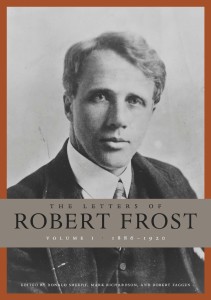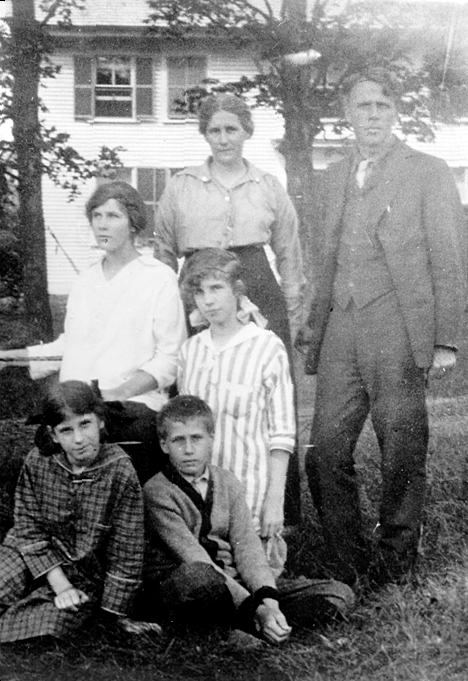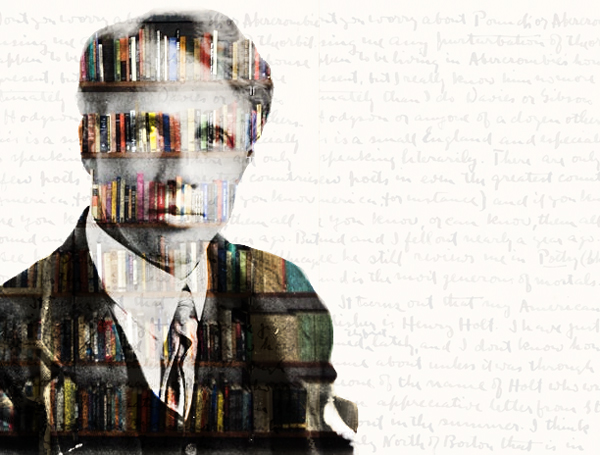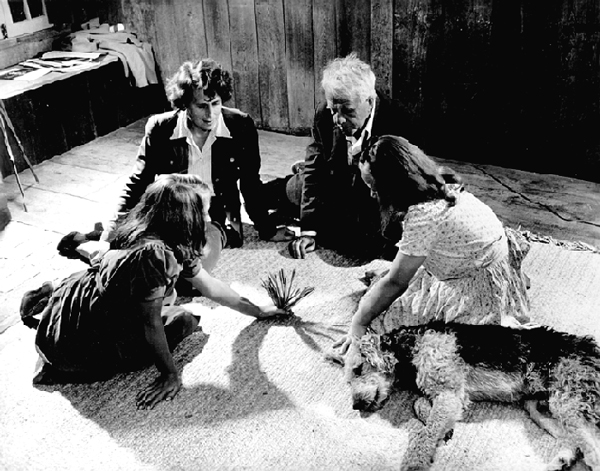How to Read Intelligently and Write a Great Essay: Robert Frost’s Letter of Advice to His Young Daughter
LITERATURE, 23 Feb 2015
Maria Popova, Brain Pickings – TRANSCEND Media Service
“The sidelong glance is what you depend on.”
 “Only a person who is congenitally self-centered has the effrontery and the stamina to write essays,” E.B. White wrote in the foreword to his collected essays. Annie Dillard sees things almost the opposite way, insisting that essayists perform a public service — they “serve as the memory of a people” and “chew over our public past.” Although he had never written an essay himself, the advice Pulitzer-winning poet Robert Frost (March 26, 1874–January 29, 1963) offered to his eldest daughter, Lesley, not only stands as an apt mediator between White and Dillard but also some of the most enduring wisdom on essay-writing ever committed to paper.
“Only a person who is congenitally self-centered has the effrontery and the stamina to write essays,” E.B. White wrote in the foreword to his collected essays. Annie Dillard sees things almost the opposite way, insisting that essayists perform a public service — they “serve as the memory of a people” and “chew over our public past.” Although he had never written an essay himself, the advice Pulitzer-winning poet Robert Frost (March 26, 1874–January 29, 1963) offered to his eldest daughter, Lesley, not only stands as an apt mediator between White and Dillard but also some of the most enduring wisdom on essay-writing ever committed to paper.
During her junior at Amherst College, Lesley shared her exasperation over having been assigned to write an academic essay about a book she didn’t find particularly inspiring. In a magnificent letter from February of 1919, found in The Letters of Robert Frost, Volume 1 (public library), the beloved poet gave his daughter sage counsel on her particular predicament, emanating general wisdom on writing, the art of the essay, and even thinking itself.
Five years before he received the first of his four Pulitzer Prizes, 45-year-old Frost writes:
I pity you, having to write essays where the imagination has no chance, or next to no chance. Just one word of advice: Try to avoid strain or at any rate the appearance of strain. One way to go to work is to read your author once or twice over having an eye out for anything that occurs to you as you read whether appreciative contradictory corroborative or parallel…
He speaks to the notion that writing, like all creativity, is a matter of selecting the few thrilling ideas from the lot of dull ones that occur to us — “To invent… is to choose,” as French polymath Henri Poincaré famously proclaimed. Frost counsels:
There should be more or less of a jumble in your head or on your note paper after the first time and even after the second. Much that you will think of in connection will come to nothing and be wasted. But some of it ought to go together under one idea. That idea is the thing to write on and write into the title at the head of your paper… One idea and a few subordinate ideas — [the trick is] to have those happen to you as you read and catch them — not let them escape you… The sidelong glance is what you depend on. You look at your author but you keep the tail of your eye on what is happening over and above your author in your own mind and nature.

The Frost family in Bridgewater, New Hampshire, 1915: Elinor and Robert, Lesley and Irma, Marjorie and Carol (University of Virginia Library)
Reflecting on his days as an English teacher at New Hampshire’s Pinkerton Academy, Frost points to precisely this over-and-above quality as the factor that set apart the few of his students who mastered the essay from the vast majority of those who never did. (Although by the time of his tenure the Academy officially accepted young women, Frost’s passing remark that his class consisted of sixty boys reveals a great deal about women’s plight for education.) He writes:
They seem incapable of the over-and-above stuff. I think maybe it goes on in their heads as they read but they are incapable of catching it. They are too directly intent on the reading. They cant get started looking two ways at once. I think too they are afraid of the simplicity of many things they think on the side as they read. They wouldn’t have the face to connect it in writing with the great author they have been reading. It may be a childhood memory; it may be some homely simile; it may be a line or verse of mother goose. They want it to be big and bookish. But they haven’t books enough in their heads to match book stuff with book stuff. Of course some of that would be all right.
Indeed, in many ways Frost’s advice on essay-writing is really advice on reading — that mutuality of thought between reader and writer, pulsed through by the book as “a heart that only beats in the chest of another.” Echoing Virginia Woolf’s dictum on how to read a book, Frost offers counsel so passionate that it becomes almost a stream-of-consciousness prose poem, barely punctuated:
The game is matching your author thought for thought in any of the many possible ways. Reading then becomes converse — give and take. It is only conversation in which the reader takes part addressing himself to anything at all in the author in his subject matter or form. Just as when we talk together! Being careful to hold up our end and to do our part agreeably without too much contradiction and mere opinionation. The best thing of all is going each other one better piling up the ideas anecdotes and incidents like alternating hands piled up on the knee. Well its out of conversation like this with a book that you find perhaps one idea perhaps yours perhaps the book’s that will serve for other lesser ideas to center around. And there’s your essay.
He lands from this poetic elation into some practical advice:
Be brief at first. You have to be honest. You don’t want to make your material seem more than it is. You won’t have so much to say at first as you will have later. My defect is in not having learned to hammer my material into one lump. I haven’t had experience enough. The details of essay won’t come in right for me as they will in narrative. Sometimes I have gotten round the difficulty by some narrative dodge.
[…]
Take it easy with the essay whatever you do. Write it as well as you can if you have to write it. Be as concrete as the law allows in it — concrete and experiential. Don’t let it scare you. Don’t strain. Remember that any old thing that happens in your head as you read may be the thing you want. If nothing much seems to happen, perhaps another reading will help. Perhaps the book is bad or is not your kind — is nothing to you and can start nothing in your nature one way or another.
He interjects a meta-remark on the nature — and naturalness — of the essay form:
Of course this letter is essay. It is material that has come to the surface of my mind in reading just as frost brings stones to the surface of the ground.
At the very end, before signing off “Affectionately Papa,” Frost can’t resist taking a little jab at the essay, voicing the sentiment that seems to explain his own lifelong resistance to partaking in the genre:
I don’t know you know whether its worth very much — I mean the essay — when you have it written. I’m rather afraid of it as an enemy to the really creative writing that holds scenes and things in the eye voices in the ear and whole situations as a sort of plexus in the body (I don’t know just where).
Lesley grew up to be an author herself, albeit not of essays — she published two books of stories for children: Really Not Really in 1962, published mere months before her father’s death, and Digging Down to China in 1968.
In its portly 850-page totality, The Letters of Robert Frost is a trove of writerly wisdom and heartwarming parental advice to the poet’s six children, of whom Lesley and her sister Irma outlived their father. Complement it with Frost’s beautiful poem on art and government, which he intended to but didn’t read at JFK’s inauguration, and F. Scott Fitzgerald on the secret of great writing in a letter of advice to his own daughter, then revisit this growing library of writers’ advice on writing.
___________________________
Brain Pickings is the brain child of Maria Popova, an interestingness hunter-gatherer and curious mind at large obsessed with combinatorial creativity who also writes for Wired UK and The Atlantic, among others, and is an MIT Futures of Entertainment Fellow. She has gotten occasional help from a handful of guest contributors.
Go to Original – brainpickings.org
DISCLAIMER: The statements, views and opinions expressed in pieces republished here are solely those of the authors and do not necessarily represent those of TMS. In accordance with title 17 U.S.C. section 107, this material is distributed without profit to those who have expressed a prior interest in receiving the included information for research and educational purposes. TMS has no affiliation whatsoever with the originator of this article nor is TMS endorsed or sponsored by the originator. “GO TO ORIGINAL” links are provided as a convenience to our readers and allow for verification of authenticity. However, as originating pages are often updated by their originating host sites, the versions posted may not match the versions our readers view when clicking the “GO TO ORIGINAL” links. This site contains copyrighted material the use of which has not always been specifically authorized by the copyright owner. We are making such material available in our efforts to advance understanding of environmental, political, human rights, economic, democracy, scientific, and social justice issues, etc. We believe this constitutes a ‘fair use’ of any such copyrighted material as provided for in section 107 of the US Copyright Law. In accordance with Title 17 U.S.C. Section 107, the material on this site is distributed without profit to those who have expressed a prior interest in receiving the included information for research and educational purposes. For more information go to: http://www.law.cornell.edu/uscode/17/107.shtml. If you wish to use copyrighted material from this site for purposes of your own that go beyond ‘fair use’, you must obtain permission from the copyright owner.

